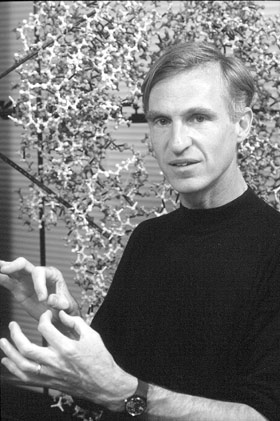Biologist Don C. Wiley, 1944-2001

Don C. Wiley, Harvard’s John L. Loeb Professor of Biochemistry and Biophysics and one of the most distinguished structural biologists of his generation, died recently at the age of 57.
Wiley was reported missing Nov. 16 by the Memphis, Tenn., police after his rental car was found on a bridge over the Mississippi River. He was in Memphis attending a meeting of the board of St. Jude Children’s Research Hospital. Wiley’s body was recovered from the river on Dec. 20.
“All of us are profoundly saddened by this news,” said Harvard President Lawrence H. Summers. “Don Wiley was a brilliant biologist and a greatly admired member of this community, and his loss leaves a tremendous void. My deepest sympathies are with his family, friends, students, and colleagues at this very difficult time.”
Wiley, whose teaching and research career spanned three decades at Harvard, conducted key research on the structure of viruses and of proteins in the human immune system. His work focused on the molecular mechanisms that enable viruses to infect cells, and on how cells respond to external challenges by presenting antigens and mobilizing defensive cells.
A senior investigator of the Howard Hughes Medical Institute, Wiley studied the structure of such viruses as HIV, Ebola, herpes simplex, and influenza. He examined the ways in which viruses bind to cell surfaces, enabling their entry into the cell, and the ways in which viruses evolve to infect different organisms and to escape the immune response of their hosts. By understanding these processes, Wiley sought to find new ways to combat these viruses.
“Don Wiley was a generous, imaginative, and questing scientist, whose work on viruses and on the nature of the immune response to infectious agents was truly illuminating,” said Jeremy R. Knowles, dean of the Faculty of Arts and Sciences. “His research contributions were both important and transforming, and his collaborative search for a better understanding inspired students and colleagues in many scientific disciplines. The loss of this engaged and engaging colleague is a tragedy for Harvard and for science.”
“The loss of Don Wiley is a tragic event,” said Andy McMahon, chairman of the Department of Molecular and Cellular Biology. “Don’s contributions to our understanding of immune system function and viral infection have had an extraordinary impact. He tackled important biological problems with a precision, clarity, and insight that was inspirational. Over the last 30 years Don has been a vital force in our department. His combination of energy, boyish enthusiasm, and sharp intellect has played a major role in all of our activities. His absence leaves a great void. Our thoughts are with his family at this sad time,”
Born Oct. 21, 1944, in Akron, Ohio, Wiley grew up in Pennsylvania and New Jersey. Wiley received his undergraduate degree in physics from Tufts University in 1966. He completed his doctoral degree in biophysics in 1971, at Harvard University, under the direction of Harvard professor William N. Lipscomb, the Nobel Prize-winning chemist. Named an assistant professor of biochemistry and molecular biology in 1971, Wiley became an associate professor in 1975, and then professor of biochemistry in 1979.
In 1995, Wiley and Harvard colleague Jack L. Strominger won the Albert Lasker Medical Research Award for their work on how the body fights infections and can reject organ transplants. In 1999, Wiley and Strominger won the prestigious Japan Prize for their cumulative discoveries related to the functioning of the human immune system. This prize, awarded by the Science and Technology Foundation of Japan, recognizes original and outstanding achievements that advance knowledge and serve the cause of peace and prosperity for humankind. Wiley also worked closely during his career with another notable structural biologist, Harvard colleague Steve Harrison.
Wiley was a member of the National Academy of Sciences and the American Philosophical Society, and a fellow of the American Academy of Arts and Sciences. His other honors include the Louisa Gross Horwitz Prize from Columbia University, the V. D. Mattia Award from the Roche Institute, the Gairdner Foundation International Award, and the Rose Payne Distinguished Scientist Award.
He is survived by his wife, Katrin, and their two children, as well as two children from a previous marriage. Harvard’s memorial arrangements will be determined soon.




